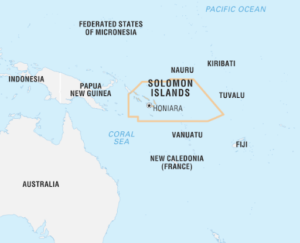In news– Recently, Solomon Islands and China signed the framework agreement on security cooperation that Australia, the US and other allies fear could be used to establish a military base in the Pacific island nation.
About Solomon Islands-
- Solomon Islands is a country consisting of six major islands and over 900 smaller islands in Oceania, to the east of Papua New Guinea and northwest of Vanuatu and about 1,500 kilometres northeast of Australia.
- It has a population of about 700,000 – mostly Melanesian but also Polynesian, Micronesian, Chinese and European.
- Almost all Solomon Islanders are Christian; most are Protestant with smaller numbers of Roman Catholics.
- English is the official language, but Pijin, an English-based Melanesian pidgin, is the language that is most widely used and understood.
- Its capital, Honiara is located on the largest island, Guadalcanal.

- The country takes its name from the Solomon Islands archipelago.
- This place is best known for the bloody fighting that took place there during World War II between the United States and Japan.
- World War II Battle of Guadalcanal named after the country’s largest island.
- It is a constitutional monarchy, with the British monarch, represented by a governor-general, serving as the formal head of state.
- Still, the country, a member of the Commonwealth, is independent, and the governor-general is appointed on the advice of the unicameral National Parliament.
- It was then known as the British Solomon Islands Protectorate and became the Solomon Islands before independence in 1978.
- A migration of settlers from Malaita, the country’s second biggest island and most populous province, to the economic opportunities on Guadalcanal and Honiara stoked ethnic tensions and eventually unrest.
















